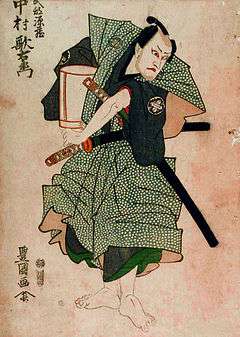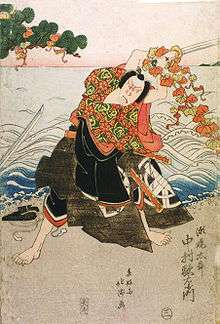Nakamura Utaemon III
Nakamura Utaemon III (中村歌右衛門 (3代目), 1778–1838) was a Japanese kabuki performer. He was a prominent member of a family of kabuki actors from the Keihanshin region.[1]
Nakamura Utaemon III | |
|---|---|
 Nakamura Utaemon III in the role of Genzō Takebe. Woodblock print by Toyokuni Utagawa, early 19th century | |
| Born | 1778 |
| Died | 1838 (aged 59–60) |

Nakamura Utaemon was a stage name with significant cultural and historical connotations.[2]
Life and career
Utaemon III was the natural son of Nakamura Utaemon I.[3] In 1782, his father presented the name Utaemon II to a favored apprentice; but the name was later retrieved (or abandoned) in 1790. Then the name was bestowed on his son, who kept it and later passed it on to his son who became Utaemon IV.[4] In the conservative Kabuki world, stage names are passed from father to son in formal system which converts the kabuki stage name into a mark of accomplishment.[5]
- Lineage of Utaemon stage names
- Nakamura Utaemon I (1714–1791) [3]
- Nakamura Utaemon II (1752-1798) [4]
- Nakamura Utaemon III (1778–1838) [1]
- Nakamura Utaemon IV (1798–1852) [1]
- Nakamura Utaemon V (1865–1940) [1]
- Nakamura Utaemon VI (1917–2001) [6]
In a long career, he acted in many kabuki plays, including the role of Seno-o no Tarō in the September 1824 production of Heike Nyōgo-ga-shima at Osaka Sumi-za.[7]
Selected works
In a statistical overview derived from writings by and about Nakamura Utaemon VI, OCLC/WorldCat encompasses roughly 10+ works in 10+ publications in 1 language and 30+ library holdings.[8]
- 1936 — - (會色さくら, Eshiki sakura) OCLC 037048749
See also
References
- Nussbaum, Louis Frédéric et al. (2005). Japan Encyclopedia, p. 691., p. 691, at Google Books
- Kurkup, James. "Nakamura Utaemon VI," The Independent (London). April 6, 2001.
- Leiter, Samuel L. (2006). Historical Dictionary of Japanese Traditional Theatre, pp. 263-264., p. 263, at Google Books
- Leiter, Samuel L. (2002). A Kabuki Reader: History and Performance, p. 78, p. 78, at Google Books
- Scott, Adolphe C. (1999). The Kabuki Theatre of Japan, p. 159., p. 159, at Google Books
- Strom, Stephanie. Nakamura Utaemon VI, 84, International Star of Kabuki", New York Times. April 4, 2001.
- Tsubouchi Memorial Theatre Museum, Utaemon III, ukiyo-e style woodblock print by Shunkōsai Hokushū. Archived 2016-03-03 at the Wayback Machine
- WorldCat Identities: 中村歌右衛門 1777 or 8-1838; 中村歌右衞門 1777 0r 8-1838; 中村歌友衛門 3世 1778-1838.
Bibliography
- Leiter, Samuel L. (2006). Historical Dictionary of Japanese Traditional Theatre. Lanham, Maryland: Scarecrow Press. ISBN 978-0-8108-5527-4; OCLC 238637010
- __________. ( 2002). A Kabuki Reader: History and Performance. ISBN 9780765607041; ISBN 9780765607058; OCLC 182632867
- Nussbaum, Louis Frédéric and Käthe Roth. (2005). Japan Encyclopedia. Cambridge: Harvard University Press. ISBN 978-0-674-01753-5; OCLC 48943301
- Scott, Adolphe Clarence. (1955). The Kabuki Theatre of Japan. London: Allen & Unwin. OCLC 622644114
Further reading
- Akatsuki, Kanenari and Ashikuni Asayama. (1819). 芝翫節用百戯通: 當藝評林圖解・戲文類字両點 (Shikansetsuyō hyakketsū: atarigei hyōrin zukai, gibun ruiji ryōten) OCLC 047907807
External links
- Waseda University, Tsubouchi Memorial Theatre Museum
- Museum of Fine Arts, Boston: Nakamura Utaemon III as Ohatsu